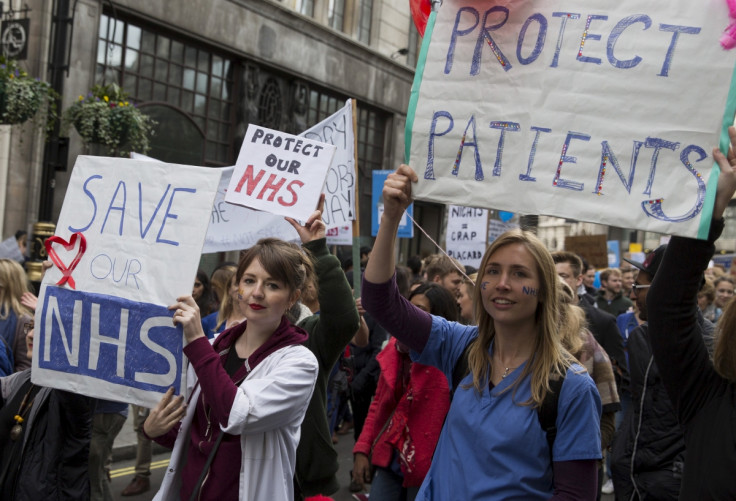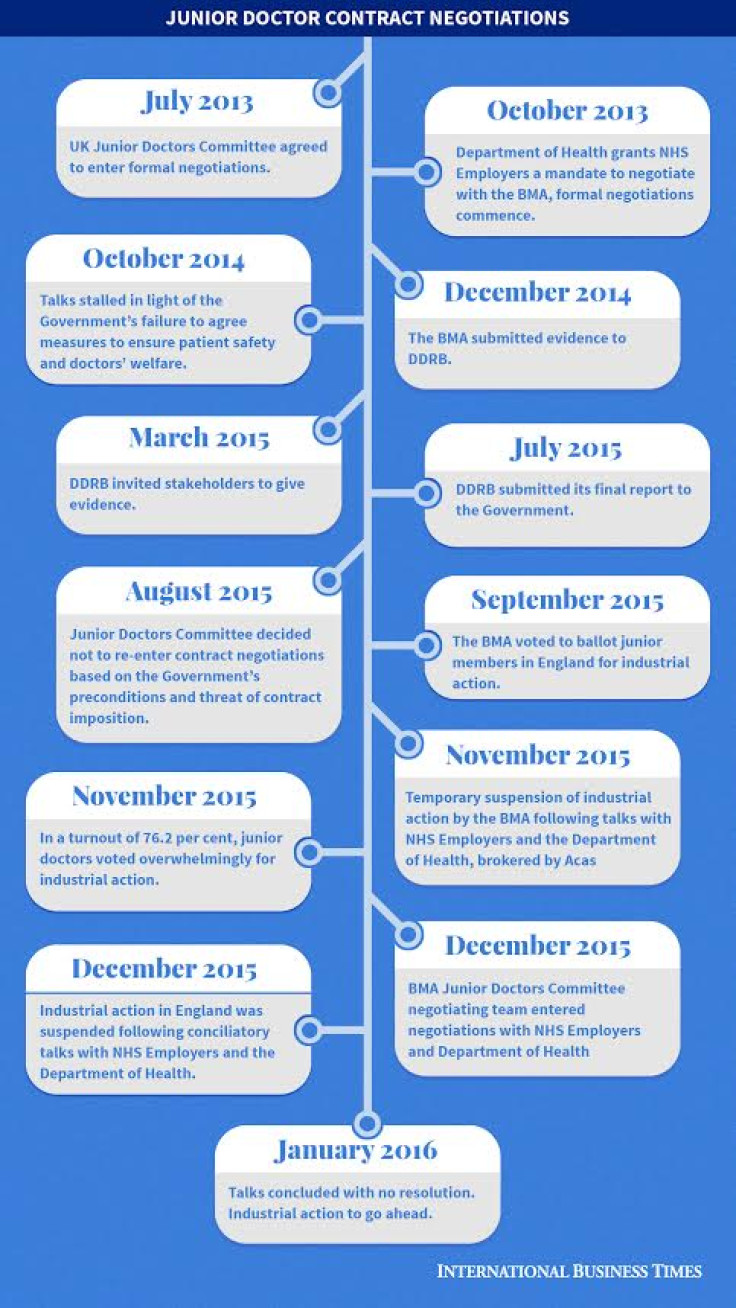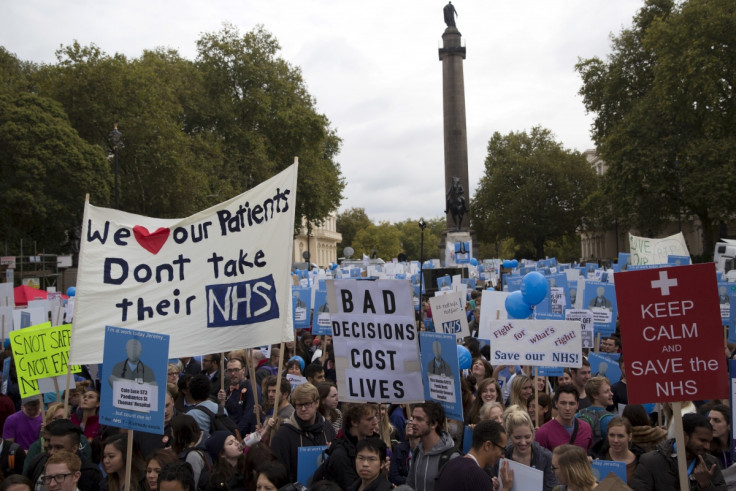Junior doctors' strike: What is the dispute over a new contract all about?

Junior doctors in England are set to stage a mass walk-out for three days after crucial talks to resolve the dispute over a new contract failed. For the first time in 40 years, junior doctors will take industrial action on Tuesday 12 January, providing only emergency cover for 24 hours from 8am. It is the first of three strikes that threaten to severely disrupt appointments and surgeries, increasing pressure on already overstretched NHS services.
The British Medical Association (BMA), the trade union for doctors in Britain, said the strikes were a result of the government's "failure to address doctors leaders' concerns with robust contractual safeguards on safe working and proper recognition of those working unsocial hours".
Despite a failure to reach a deal so far, both sides have said they want to continue to negotiate ahead of the industrial action next week. But what is the dispute all about - and why has no agreement been reached?
What is the dispute about?
Junior doctors and their leaders are objecting to the prospect of a new contract. In 2012, the government said the current contracts, which set the employment conditions of the NHS's junior doctors in England and were last updated in the 1990s, needed to be changed.
The BMA began negotiations, but talks broke down in 2014 and the row escalated after ministers said they would bring the new contracts into force in August 2016.
The details of the dispute are changing as the row continues, but the key issues concern how much junior doctors are paid for the hours they work, the requirement to work in different settings and when they work, with a focus on nights and weekends.
What will the new contracts change?
According to the latest government information, the new contract proposes an 11% rise in basic pay for doctors, in exchange for more evening and weekend work without overtime pay. Health Secretary Jeremy Hunt said just 1% of junior doctors would see a pay cut – the medics who work lots of extra hours, therefore qualifying for the current premium payments that will be scrapped under the new contracts. The Department of Health has also said they are not trying to reduce the overall cost of junior doctors, to try alleviate alarm.
The changes aim, in part, to make it less expensive to employ extra doctors at weekends, as part of the government's plan to expand NHS services.
However, there are concerns that some doctors will end up being paid less and that restrictions on the number of hours worked by doctors are not strong enough. The increase in basic pay of 11% is not a rise in overall earnings, but instead offsets losses from other contractual changes. Junior doctors say they will be expected to work on average 30% more hours for an 11% increase in salary. Junior doctors' pay will only be "protected" until 2019, so there are fears over what will happen afterwards.
There will also be an end to automatic pay rises for junior doctors, with pay based more on responsibility rather than time served. This, the BMA says, may impact those who take time off for parental leave the most.

What are the wider issues behind the dispute?
The dispute is complicated by wider issues concerning the NHS, such as the culture of long working hours faced by most hospital medics, shortages of staff and patient safety, an issue the BMA and supporters of the strikes say will be at risk if the new contract is introduced.
It is set against the backdrop of the government's plan to expand emergency medical care services offered by the NHS by 2020, which requires doctors to work more weekends, without spending too much of the NHS's resources.
What does the BMA say?
The doctors' union said in a document about the dispute and planned industrial action: "Junior doctors are angry at the way in which the government is riding roughshod over the genuine concerns doctors are raising about patient safety and doctors' wellbeing. We are fed up of hearing government ministers undervalue our work and undermine patients' trust in us.
"Many of us are already at breaking point, looking to work overseas or even leaving the medical profession altogether. Junior doctors believe that the government's plans will harm the next generation of doctors – and the future of the NHS itself. Nothing the government has said has given us any hope that they are prepared to negotiate properly and listen to our concerns.
"First and foremost, we want to negotiate a contract that is fair for doctors, safe for patients and provides a future for the NHS. However, to be able to get back round the table, we want the government to remove the threat to impose a new, unnegotiated contract on us."

What does the BMA want?
The BMA has said it wants to negotiate a contract that is fair for doctors, safe for patients and provides a future for the NHS – and it wants the government to remove the threat to impose a new unnegotiated contract on medics.
The doctors' union lists these key requirements:
• Pay fairly for the hours junior doctors work.
• Ensure the hours medics work are safe.
• Provide cover at weekends and at night, but also recognise a junior doctor's right to a family life.
• Ensure the new contract does not disadvantage those doctors who work less than full-time or who take parental leave.
Who will the strike affect?
The BMA said the 24-hour strike will start at 8am on Tuesday 12 January, during which junior doctors will only give emergency care.
It added that a second 48-hour strike would take place at 8am on Tuesday 26 January, if progress is not made. Industrial action is also planned for Wednesday 10 February, during which junior doctors will stop working entirely between 8am and 5pm.
Who backed strike action?
Some 98% of junior doctors balloted by the BMA voted in favour of strikes, of the 76% who participated in the vote in November. Approximately 37,000 junior doctors took part in the vote.
Junior doctors in numbers
There are 53,000 junior doctors in England.
Junior doctors can work seven days a week.
The NHS treats over four million patients.
Junior doctors care for patients in hospitals 235 days a year.
The basic starting salary for a junior doctor is about £23,000, but this increases in the second year to around £28,000.
For a doctor in specialist training, the basic salary is between £30,000 and £47,000.
© Copyright IBTimes 2024. All rights reserved.






